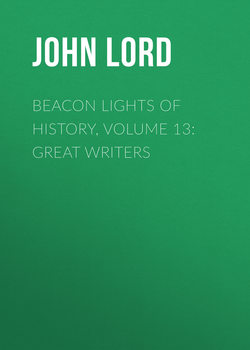Beacon Lights of History, Volume 13: Great Writers

Реклама. ООО «ЛитРес», ИНН: 7719571260.
Оглавление
John Lord. Beacon Lights of History, Volume 13: Great Writers
PUBLISHERS' PREFACE
JEAN JACQUES ROUSSEAU
SIR WALTER SCOTT
LORD BYRON
THOMAS CARLYLE
LORD MACAULAY
SHAKSPEARE; OR, THE POET. 3
JOHN MILTON: POET AND PATRIOT. 4
JOHANN WOLFGANG VON GOETHE. 5
I. THE MAN
II. THE WRITER
ALFRED (LORD) TENNYSON
AUTHORITIES
Отрывок из книги
Two great political writers in the eighteenth century, of antagonistic views, but both original and earnest, have materially affected the whole science of government, and even of social life, from their day to ours, and in their influence really belong to the nineteenth century. One was the apostle of radicalism; the other of conservatism. The one, more than any other single man, stimulated, though unwittingly, the French Revolution; the other opposed that mad outburst with equal eloquence, and caused in Europe a reaction from revolutionary principles. While one is far better known to-day than the other, to the thoughtful both are exponents and representatives of conflicting political and social questions which agitate this age.
These men were Jean Jacques Rousseau and Edmund Burke,–one Swiss, and the other English. Burke I have already treated of in a former volume. His name is no longer a power, but his influence endures in all the grand reforms of which he was a part, and for which his generation in England is praised; while his writings remain a treasure-house of political and moral wisdom, sure to be drawn upon during every public discussion of governmental principles. Rousseau, although a writer of a hundred years ago, seems to me a fit representative of political, social, and educational ideas in the present day, because his theories are still potent, and even in this scientific age more widely diffused than ever before. Not without reason, it is true, for he embodied certain germinant ideas in a fascinating literary style; but it is hard to understand how so weak a man could have exercised such far-reaching influence.
.....
Aside from these great falsities,–the perfection of natural impulse, the inferiority of woman, and the worthlessness of Christianity,–as inculcated in this book, "Émile" must certainly be ranked among the great classics of educational literature. With these expurgated it confirms the admirable methods inspired by its unmethodical suggestions. Noting the oppressiveness of the usual order of education through books and apparatus, he scorns all tradition, and cries, "Let the child learn direct from Nature!" Himself sensitive and humane, having suffered as a child from the tyranny of adults, he demands the tenderest care and sympathy for children, a patient study of their characteristics, a gentle, progressive leading of them to discover for themselves rather than a cramming of them with facts. The first moral education should be negative,–no preaching of virtue and truth, but shielding from vice and error. He says: "Take the very reverse of the current practice, and you will almost always do right." This spirit, indeed, is the key to his entire plan. His ideas were those of the nineteenth, not the eighteenth century. Free play to childish vitality; punishment the natural inconvenience consequent on wrong-doing; the incitement of the desire to learn; the training of sense-activity rather than reflection, in early years; the acquirement of the power to learn rather than the acquisition of learning,–in short, the natural and scientifically progressive rather than the bookish and analytically literary method was the end and aim of "Émile."
Actually, this book accomplished little in its own time, chiefly because of its attack on established religion. Influentially, it reappeared in Pestalozzi, the first practical reformer of methods; in Froebel, the inventor of the Kindergarten; in Spencer, the great systematizer of the philosophy of development; and through these its spirit pervades the whole world of education at the present time.
.....